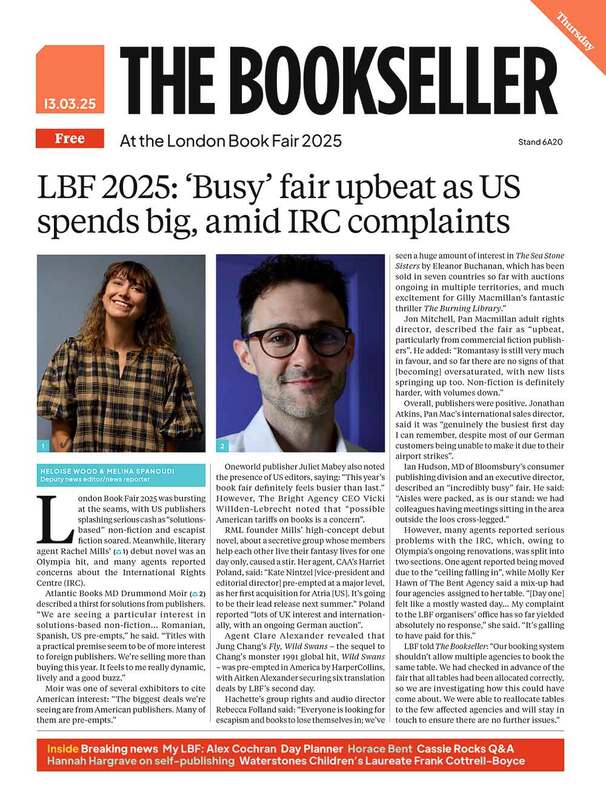You are viewing your 1 free article this month. Login to read more articles.
Royalties survey sparks calls for change as Society of Authors reveals 'increased reliance on hardship grants'
Following a recent survey by The Bookseller on royalties and advances, which revealed widespread problems around payments, authors have suggested changes they would like to see. Some publishers have also revealed they are exploring changes, with one looking at “moving away from an advances system”, while the Society of Authors has said it has seen “an increased reliance on hardship grants”.
In the survey of 262 writers in September, about half of respondents said they had encountered payment problems, some reporting decade-long delays due to alleged "financial terrorism", as well as a reliance on loans, hardship grants and food banks.
Many authors responding to the survey suggested solutions to late payments through more structured procedures, regular payments and more accountability—including penalties—for missed earnings.
A few suggested the tactics described, including pursuing reversion of rights or withholding the manuscript. Some called for more responsibility on the publisher to act within certain time frames, including editors responding to manuscripts, as this seemed to slow things down.
Several mentioned the need for penalties. One author wrote: “I think publishers should have harsher penalties for failing to meet payment dates.” Another author, who spent 18 months chasing £30,000, said: “In journalism, if a publication doesn’t pay you on time you can start to add a late fee and accruing daily late fines. Authors should be able to do the same.”
Many called for clearer information and a more stringent, structured payment process. A fiction writer said: “It’s not that difficult to set up systems where people can view their royalties every month. Amazon do it and it’s streamlined and easy.”
One author said: “I would like more of a time frame pre-publication as to how royalties are handled. There is no information on this and no advice on how to read your royalties when they arrive in your inbox every six months.”
This was echoed by a novelist who said: “Clearer communication from publishers and agents to authors, an agreed timetable and greater explanation around royalty statements would also be valuable.” Another writer reported that they had never received a late payment but called for for clarity and suggested "an author port where you have the ability to check in on how your work is selling, if you want to". Meanwhile, a historical author echoed this, calling for “baked advance dates into contract that aren’t tied to decisions/events that lie outside of [the] author’s control”.
Another author stressed that literary agencies must not overlook its lesser-earning clients. “I think literary agencies need to have more concern for their lower-earning authors who might be waiting—who almost certainly are waiting—on these payments. If you commit in an agency contract to pay royalties in April and October, you should have to, whatever it takes.”
Most publishers contacted by the The Bookseller did not respond to an invitation for comment, though some suggested change was on the way. The Bookseller understands that at least one publisher is conducting a review of its payment system, though it declined to share this publicly.
Cambridge University Press (CUP) is exploring changes to its payment system. “Cambridge is generally trying to move away from advances,” a spokesperson said. “To date, in 2024 there are only records of 84 advance payments. Cambridge is actively looking to see if there is anything we can do to improve processes from our end.”
The spokesperson added: “Paying royalties and advances is done by our royalties department. Advances are written into contracts. The royalties department has not been involved in any legal proceedings regarding advances. The royalties payment process is highly rigorous.”
Thames & Hudson told The Bookseller that it took the issue of royalty payment extremely seriously and consequently kept its systems under regular review.
Lara Borlenghi, chief financial officer at Pan Macmillan, said: “We have various processes in place to minimise payment delays to our authors and illustrators. The vast majority of payments are made in accordance with contractual timings, but we are always looking for ways we can improve.”
Agents told The Bookseller that smaller publishers tended to struggle to pay on time. Clare Alexander, of Aitken Alexander, said: “In brief, the larger corporates usually pay advances and royalties in a timely fashion. Some indies insist on receiving invoices before paying advances, which is annoying as they are contractually obliged to pay as per the agreement. It’s a way of delaying things and is a practice I profoundly dislike. Smaller indies are of course much less dependable about paying, as their cash flow can be dicey.”
Sam Copeland, at RCW, was more positive: “UK publishers are overall generally pretty good at speedy payment, but we have noticed an annoying trend of publishers requiring an invoice to make payment, which puts the onus on the agent rather than publisher to release payments. We also see publishers occasionally requiring editors to sign off all payments, which also slows things down. Both of these processes are subtle hurdles to speedy payment. Publishers probably feel it’s within the realms of reasonable behaviour, but they are unnecessary.”
Lizzy Kremer, managing director at David Higham Associates (DHA) said that changes made to advance payout schedules since the pandemic mean that authors are holding more risk and struggling to manage their finances despite the publishers’ economic power, adding that it is an "industry of Davids and Goliaths".
She added a more "unglamorous reason" is inefficiencies and errors in royalty accounting, describing it as a "hidden epidemic". She added: "[It demands] further investment of money and time on their parts, and in the hope of change at DHA we are in the process of putting together specific feedback for each publisher, detailing the simple improvements that could be made to ensure that authors receive correct sums more quickly.
"Their [publishers’] teams are under-resourced and seem to lack good training for new staff. We have more staff in our royalties team at DHA than ever before and is in large part because the systems of reporting and delivery are so unfit for purpose and marred with errors of understanding or of implementation."
She also described issues with statements, with some lacking basic information including a clear indication of what the format is, a total figure for each format or ISBN, or lifetime sales. Kremer said there was a "lack of consistency" making it "labour and time intensive for agents to separate, process, and pay out to authors".
She added: "Errors take weeks to resolve. It is getting worse every year and our requests for interest on delayed and missing payments are becoming more common as a sign of that."
Several other agents contacted The Bookseller after the survey results to say the findings confirmed some of their concerns. One agent echoed many authors who said company acquisitions affected payments. The agent said of their 12-year career: “Every time I have had difficulty getting advances or royalties paid in a timely fashion it has turned out to be because the publisher concerned has either been refinancing, making an acquisition or is in the process of being sold. It hasn’t happened that often but when it has the publisher concerned has always been an indie.”
The Society of Authors told The Bookseller the survey confirmed royalties as a significant issue. “Late payment has been a concern since the SoA’s inception and, whether it is 1884 or 2024, late payment can have catastrophic consequences, impacting the ability of authors to pay for the basic necessities of life such as household bills,” the SoA’s chief executive Anna Ganley said.
“This is also evidenced by authors’ increased reliance on hardship grants such as the SoA Authors’ Contingency Fund, their use of loans or savings, and of food banks to survive—this precarity harms authors’ well-being and mental health, and is in turn exacerbated by the stress of having to chase late payments.”
Ganley added: “The Bookseller’s findings mirror our own experience and the feedback we receive from members. Although the law provides ways for authors to chase payment, and to add compensation and interest to monies owed, in our experience these are little-known and are often not used by authors.”
In response to The Bookseller’s findings, Ganley said the SoA was calling for the following:
- Publishers to uphold the values provided in the Industry Professional Values Statement.
- Transparency and open communication between publishers, agents and authors.
- Regular and detailed accounting statements to be sent to authors by publishers by default.
- Publishing contracts providing clear and unequivocal definitions of key terms and clear accounting provisions, as per the SoA’s CREATOR campaign for fair contract terms.
- Mechanisms to ensure the author is not penalised if there is a delay with edits or publication (e.g. ‘advance will be paid on first publication or 12 months after signature of the contract, whichever is earlier’).
- Publishers to establish a clear procedure for authors to follow in the event that they are not paid in line with their contracts, or to at least provide a named contact within the company for payment-related issues.
- Publishers to act in accordance with their legal obligations. Authors have a legal right to be paid within 30 days of invoicing, unless specifically agreed otherwise. Communications from authors or agents about late payments should be treated promptly and with professionalism and consideration. The right of authors to add interest on late payments (without prejudice to their other rights under their contracts) should be accepted and honoured.
- Authors and their agents to chase any late payment, with the added compensation and interest prescribed for by law.























